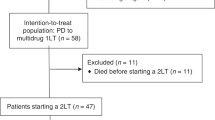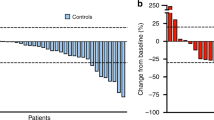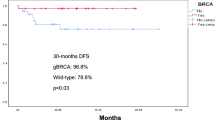Abstract
Purpose
The clinical outcome and the efficacy of chemotherapy in pancreatic cancer patients with BRCA1/2 Variants of Unknown Significance (VUS) is unknown. We explored the effects of chemotherapy with or without Platinum in non metastatic and metastatic pancreatic cancer patients with BRCA1/2 VUS.
Methods
A retrospective analysis of non-metastatic or metastatic pancreatic cancer patients with gBRCA1/2 VUS treated in 13 Italian centers between November 2015 and December 2020 was performed. All patients were assessed for toxicity and RECIST 1.1 response. Metastatic patients were evaluated for survival outcome.
Results
30 pancreatic cancer patients with gBRCA1/2 VUS were considered: 20 were M+ and 10 were non-M+. Pl-CT was recommended to 16 patients: 10 M+ (6 FOLFIRINOX and 4 PAXG) and 6 non-M+ (3 FOLFIRINOX and 3 PAXG); 11 patients received Nabpaclitaxel-Gemcitabine (AG; 8 M+) and 3 patients (2 M+) were treated with Gemcitabine (G). The RECIST 1.1 response rate was 27% for AG and 44% for Pl-CT (22% for (m) FOLFIRINOX and 71% PAXG). 1 year Progression-Free Survival was 37.5% for patients treated with AG and 33% in the Pl-CT subgroup. Median Overall Survival (OS) was 23.5 months for patients treated with AG and 14 months for the Pl-CT subgroup. 1 Year and 2 Year OS were numerically better for AG (1 Year OS: 75% vs 60% and 2 Year OS: 50% and 20% in AG and Pl-CT subgroups, respectively) as well.
Conclusions
Pl-CT does not seem to be associated with a better outcome compared to AG chemotherapy in PDAC patients with BRCA 1/2 VUS.
Similar content being viewed by others
Data availability
The datasets generated during and/or analysed during the current study are available from the corresponding author on reasonable request.
References
Siegel RL et al (2021) Cancer statistics, 2021. Ca Cancer J Clin 71(1):7–33
Wattenberg MM et al (2020) Platinum response characteristics of patients with pancreatic ductal adenocarcinoma and a germline BRCA1, BRCA2 or PALB2 mutation. Br J Cancer 122(3):333–339
Pokataev I et al (2020) Efficacy of platinum-based chemotherapy and prognosis of patients with pancreatic cancer with homologous recombination deficiency: comparative analysis of published clinical studies. ESMO open. 5(1):e000578
Rosen MN (2021) BRCA mutated pancreatic cancer: a change is coming. World J Gastroenterol 27(17):1943
Golan T et al (2014) Overall survival and clinical characteristics of pancreatic cancer in BRCA mutation carriers. Br J Cancer 111(6):1132–1138
Orsi G et al (2021) Chemotherapy toxicity and activity in patients with pancreatic ductal adenocarcinoma and germline BRCA1-2 pathogenic variants (gBRCA1-2pv): a multicenter survey. ESMO open 6(5):100238
Conroy T et al (2011) FOLFIRINOX versus gemcitabine for metastatic pancreatic cancer. New England J Med 364(19):1817–1825
Conroy T et al (2018) FOLFIRINOX or gemcitabine as adjuvant therapy for pancreatic cancer. New England J Med 379(25):2395–2406
Reni M et al (2018) Nab-paclitaxel plus gemcitabine with or without capecitabine and cisplatin in metastatic pancreatic adenocarcinoma (PACT-19): a randomised phase 2 trial. Lancet Gastroenterol Hepatol 3(10):691–697
Reni M et al (2007) A randomized phase II trial of PEXG (cisplatin, epirubicin, capecitabine, gemcitabine) or PDXG (docetaxel) regimen in advanced pancreatic adenocarcinoma. J Clin Oncol 25:4628–4628
Hoff V, Daniel D et al (2013) Increased survival in pancreatic cancer with nab-paclitaxel plus gemcitabine. New England J Med 369(18):1691–1703
Golan T et al (2019) Maintenance olaparib for germline BRCA-mutated metastatic pancreatic cancer. New England J Med 381(4):317–327
Chen F, Roberts NJ, Klein AP (2017) Inherited pancreatic cancer. Chin Clin Oncol 6(6):58
Golan T et al (2020) Geographic and ethnic heterogeneity of germline BRCA1 or BRCA2 mutation prevalence among patients with metastatic pancreatic cancer screened for entry into the POLO trial. J Clin Oncol 38(13):1442–1454
Peretti U et al (2021) Germinal BRCA1-2 pathogenic variants (gBRCA1-2pv) and pancreatic cancer: epidemiology of an Italian patient cohort. ESMO open 6(1):100032
Eleonora LA et al (2021) Brca-mutant pancreatic ductal adenocarcinoma. Br J Cancer 125(10):1321–1332
Sharon E et al (2008) Sequence variant classification and reporting: recommendations for improving the interpretation of cancer susceptibility genetic test results. Human Mutat 29(11):1282–1291
Daly MB et al (2021) Genetic/familial high-risk assessment: breast, ovarian, and pancreatic, version 2021, NCCN clinical practice guidelines in oncology. J National Comprehens Cancer Network 19(1):77–102
Eccles BK et al (2015) Understanding of BRCA VUS genetic results by breast cancer specialists. BMC Cancer 15(1):1–9
Richter Sue et al (2013) Variants of unknown significance in BRCA testing: impact on risk perception, worry, prevention and counseling. Ann Oncol 24:69–74
Oulas A et al (2019) Selecting variants of unknown significance through network-based gene-association significantly improves risk prediction for disease-control cohorts. Sci Rep 9(1):1–15
Richards S et al (2015) Standards and guidelines for the interpretation of sequence variants: a joint consensus recommendation of the american college of medical genetics and genomics and the association for molecular pathology. Genet Med 17(5):405–423
Landrum MJ et al (2014) ClinVar: public archive of relationships among sequence variation and human phenotype. Nucl Acids Res 42(D1):D980–D985
Spurdle AB et al (2012) ENIGMA—evidence-based network for the interpretation of germline mutant alleles: an international initiative to evaluate risk and clinical significance associated with sequence variation in BRCA1 and BRCA2 genes. Human Mutat 33(1):2–7
Freeman PJ et al (2018) VariantValidator: Accurate validation, mapping, and formatting of sequence variation descriptions. Human Mutat 39(1):61–68
Sonnhammer E, Eddy LL, Sean R, Durbin R (1997) a comprehensive database of protein domain families based on seed alignments. Proteins Struct Function Bioinform 28(3):405–420
Burris HA, Moore MJ, Andersen J, Green MR, Rothenberg ML et al (1997) Improvements in survival and clinical benefit with gemcitabine as first-line therapy for patients with advanced pancreas cancer: a randomized trial. J Clini Oncol 15(6):2403–2413
Spurdle AB et al (2012) Enigma—evidence-based network for the interpretation of germline mutant alleles: an international initiative to evaluate risk and clinical significance associated with sequence variation in BRCA1 and BRCA2 genes. Human Mutation 33(1):2–7
Guidugli L et al (2013) A classification model for brca2 dna binding domain missense variants based on homology-directed repair activitycharacterization of BRCA2 DNA binding domain mutations. Cancer Res 73(1):265–275
Guidugli L et al (2018) Assessment of the clinical relevance of BRCA2 missense variants by functional and computational approaches. Am J Human Gene 102(2):233–248
Caputo SM et al (2021) Classification of 101 BRCA1 and BRCA2 variants of uncertain significance by cosegregation study: a powerful approach. Am J Human Gene 108(10):1907–1923
Tempero M et al (2021) Ibrutinib in combination with nab-paclitaxel and gemcitabine for first-line treatment of patients with metastatic pancreatic adenocarcinoma: phase III RESOLVE study. Ann Oncol 32(5):600–608
CutsemEric V et al (2020) Randomized phase III trial of pegvorhyaluronidase alfa with nab-paclitaxel plus gemcitabine for patients with hyaluronan-high metastatic pancreatic adenocarcinoma. J Clin Oncol 38(27):3185
BEKAII-SAAB T et al (2021) 1466P Napabucasin+ nab-paclitaxel with gemcitabine in patients (pts) with metastatic pancreatic adenocarcinoma (mPDAC): Results from the phase III CanStem111P study. Ann Oncol 32:S1084–S1085
Gill S et al (2016) PANCREOX: a randomized phase III study of fluorouracil/leucovorin with or without oxaliplatin for second-line advanced pancreatic cancer in patients who have received gemcitabine-based chemotherapy. J Clin Oncol 34(32):3914–3920
Oettle H et al (2014) Second-line oxaliplatin, folinic acid, and fluorouracil versus folinic acid and fluorouracil alone for gemcitabine-refractory pancreatic cancer: outcomes from the CONKO-003 trial. J Clin Oncol 32(23):2423–2429
Wang-Gillam A et al (2016) Nanoliposomal irinotecan with fluorouracil and folinic acid in metastatic pancreatic cancer after previous gemcitabine-based therapy (NAPOLI-1): a global, randomised, open-label, phase 3 trial. Lancet 387(10018):545–557
Chiorean EG et al (2021) Randomized phase ii study of PARP inhibitor ABT-888 (Veliparib) with modified FOLFIRI versus FOLFIRI as second-line treatment of metastatic pancreatic cancer: SWOG S1513FOLFIRI with or without veliparib for pancreatic cancer. Clin Cancer Res 27(23):6314–6322
Dines JN et al (2020) Systematic misclassification of missense variants in BRCA1 and BRCA2 “coldspots.” Gene Med 22(5):825–830
Hoffman-Andrews L (2017) The known unknown: the challenges of genetic variants of uncertain significance in clinical practice. J Law Biosci 4(3):648
Li MM et al (2017) Standards and guidelines for the interpretation and reporting of sequence variants in cancer: a joint consensus recommendation of the association for molecular pathology, american society of clinical oncology, and college of american pathologists. J Mol Diagnost 19(1):4–23
Federici G, Soddu S (2020) Variants of uncertain significance in the era of high-throughput genome sequencing: a lesson from breast and ovary cancers. J Exp Clin Cancer Res 39(1):1–12
Choi MC (2019) Clinical significance of variants of unknown significances in BRCA genes. J Gynecol Oncol. https://doi.org/10.3802/jgo.2019.30.e80
Easton DF et al (2007) A systematic genetic assessment of 1,433 sequence variants of unknown clinical significance in the BRCA1 and BRCA2 breast cancer–predisposition genes. Am J Human Gene 81(5):873–883
Lindor NM et al (2012) A review of a multifactorial probability-based model for classification of BRCA1 and BRCA2 variants of uncertain significance (VUS). Human Mutat 33(1):8–21
Parsons MT et al (2019) Large scale multifactorial likelihood quantitative analysis of BRCA1 and BRCA2 variants: An ENIGMA resource to support clinical variant classification. Human Mutat 40(9):1557–1578
Author information
Authors and Affiliations
Corresponding author
Ethics declarations
Conflict of interests
MN reports travel expenses from Celgene and AstraZeneca; speaker honorarium from Accademia della Medicina and Incyte; honoraria from Sandoz, Medpoint SRL and Servier for editorial collaboration; consultant honoraria from EMD Serono, Basilea Pharmaceutica, Incyte, MSD Italia, Servier and Taiho. AA has served as advisory and speaker for Amgen and Servier. LS reports speakers’ and consultant's fee from MSD, Astra-Zeneca, Servier, Bayer, Merck, Amgen, Pierre-Fabre. GT reports advisory board for BMS, AZ, MSD, Merck, Servier. GG reports honoraria for advisory board from Astra Zeneca. EG reports advisory board for Bristol Myers Squibb, Eli Lilly, Viatris,Amgen, Servier. LP reports personal fee for scientific consultancy from Astra Zeneca. SC reports travel expenses and personal honoraria for the following companies: Speaker for Amgen, Bayer, Eli Lilly, Servier; Advisory Boards for Amgen, Eli Lilly, Bayer. Baxter, Merck Sharp & Dohme (MSD), Servier; Consultant for Amgen, Baxter, Eli Lilly, Celgene, Novartis, MSD; Research grant for Celgene, Eisai. MM reports personal honoraria as speaker or consultant for Astrazeneca, MSD, Boehringer Ingelheim, Pfizer, EUSA Pharma, Merck-Serono, Novartis, Roche, Ipsen, Mylan. MR reports advisory board for BMS, PANAVANCE, Viatris, SOTIO, Lilly, Servier, MSD, Astra-Zeneca, Celgene, Shire, Baxter and a research grant from Astra-Zeneca. All remaining authors have declared no competing interests.
Ethics approval and consent to participate
Before testing, all patients signed an informed consensus statement that was revised and approved by a local ethics committee and allowed for genetic testing and data collection, analysis and elaboration. Data were irreversibly anonymised before entering into the database.
Additional information
Publisher's Note
Springer Nature remains neutral with regard to jurisdictional claims in published maps and institutional affiliations.
Rights and permissions
Springer Nature or its licensor (e.g. a society or other partner) holds exclusive rights to this article under a publishing agreement with the author(s) or other rightsholder(s); author self-archiving of the accepted manuscript version of this article is solely governed by the terms of such publishing agreement and applicable law.
About this article
Cite this article
Militello, A.M., Orsi, G., Cavaliere, A. et al. Clinical outcomes and response to chemotherapy in a cohort of pancreatic cancer patients with germline variants of unknown significance (VUS) in BRCA1 and BRCA2 genes. Cancer Chemother Pharmacol 92, 501–510 (2023). https://doi.org/10.1007/s00280-023-04585-w
Received:
Accepted:
Published:
Issue Date:
DOI: https://doi.org/10.1007/s00280-023-04585-w




